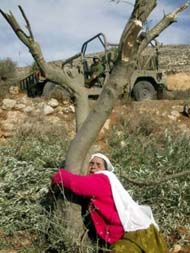| Date posted: January 20, 2010 By Hajr Al-Ali for MIFTAH | |
| Anyone who has reveled in Middle Eastern or Mediterranean cuisine knows the important role olives play in giving their taste buds cause to cheer. Whether eaten whole or through their oil, olives complete nearly any meal. Yet, here in Palestine in particular, zaytoun (olives) provide flavor to our lives beyond simply satisfying our palates. They are a vital part of the Palestinian economy, and are the nation’s largest commercial crop. According to UN figures, olive trees account for more than 45 percent of all farmland and 80 percent of all orchards in Palestine. They also happen to be a consistent target for Israeli settler and military attacks. In November, a group of settlers from the Yitzhar settlement, south of Nablus, cut down nearly 100 olive trees in the village of Burin the day before it was about to celebrate the harvest; a celebration which comes after two years of tending. In the village of Beit Ummar in Hebron, Israeli troops banned farmers from planting over 1,500 olive trees by claiming it was a “closed military area,” despite an Israeli court allowing the farmers to do so. And according to the Palestinian Ministry of Agriculture “a productive olive tree is uprooted [by the Israeli military and settlers] every minute in the occupied Palestinian territories.” Such incidents have become increasingly frequent. Like termites, they gnaw away at Palestine’s geographical, cultural, and economic landscapes, particularly affecting the 65 percent of Palestinian families living in rural areas that are dependent on the agricultural sector. In an attempt to rebuild the livelihoods of these families, crop-planting projects have begun to sprout up across the West Bank. This past Saturday, January 16, I trekked out to such an event with some friends. We woke up early to weave our way through Palestine’s notorious hills to a village in northwest Nablus called Deir Sharaf. Upon stepping out our service taxi, we were greeted by community members and volunteers who held out hoes and rakes for us to take, telling us with broad, knowing smiles that we should get busy planting. The event was the first for the village, “but not the last”; part of the “10,000 Trees for Nablus Campaign.” Organized by Al-Hayat Center for Civil Society Development and supported by two UK-based organizations, the Friends of Nablus & Surrounding Areas Association (FONSA) and the Dundee Nablus Twinning Association (DNTA), the initiative seeks to provide a sustainable source of income for the community’s families. Yet, as is often the case when it comes to Palestinian rights to their land and Israeli counter claims, this endeavor did not come without struggle and stipulations. Council members of Al-Hayat Center explained that the Israeli army prevented them from planting the trees in their original location, as it was “too close to the [separation] wall.” Subsequently, residents of Deir Sharaf were warned that if they dared to go near it, they would be shot. Their neighbors in the settlement of Shave Shomron did not receive this same warning, and often cross over to torment Deir Sharaf villagers by throwing trash onto their land or instigating clashes. Recently, settlers released pigs in Deir Sharaf which not only destroyed crops, but also brutally attacked a farmer, leaving him in the ICU for three months. Such acts are, of course, another way to prevent the smooth passage of “sustainability” from entering into Palestinian life. In addition to such attacks, Israel’s land confiscations, uprooting and burning of trees, and the curfews and checkpoints which deny farmers access to both local and international markets, have systematically and significantly deteriorated the Palestinian economy. It’s another flagrant sign of where Israel stands in desiring a viable peace. After all, the strong link between a sustainable economy and sustainable peace is no secret. Continued Israeli aggression against Palestinian farmers, make Netanyahu's claim that his government would be a “partner for peace, for security and for rapid economic development of the Palestinian economy” laughable. By destroying fields of olive trees to build more illegal settlements, separation fences and walls Israel has, quite literally, burned down the universal symbol for peace. For Palestinians, olive trees stand as more than the archaic symbol of harmony. Their roots are grounded in resistance by those who struggle to protect them. Maha, a young woman volunteering in Deir Sharaf who claimed her English was “no good,” best explained the significance of olive trees to Palestinian life: “They are our grandfather. They are our beauty. They are our air.” We can only hope that one day Israel, as well as the international community, will recognize Palestine’s right to breathe. Hajr Al-Ali is a Writer for the Media and Information Department at the Palestinian Initiative for the Promotion of Global Dialogue and Democracy (MIFTAH). She can be contacted at mid@miftah.org. | |
Labels
- Notes (3650)
- Palestine (3342)
- letters (843)
- America (605)
- Ibrahim's Estate (485)
- Human Rights (440)
- art (208)
- poem (141)
- Nakba (138)
- books (104)
- Gardens (59)
- Non-violence (18)
Wednesday, January 20, 2010
Preserving Palestine’s Roots of Resistance By Hajr Al-Ali for MIFTAH
Subscribe to:
Post Comments (Atom)



No comments:
Post a Comment